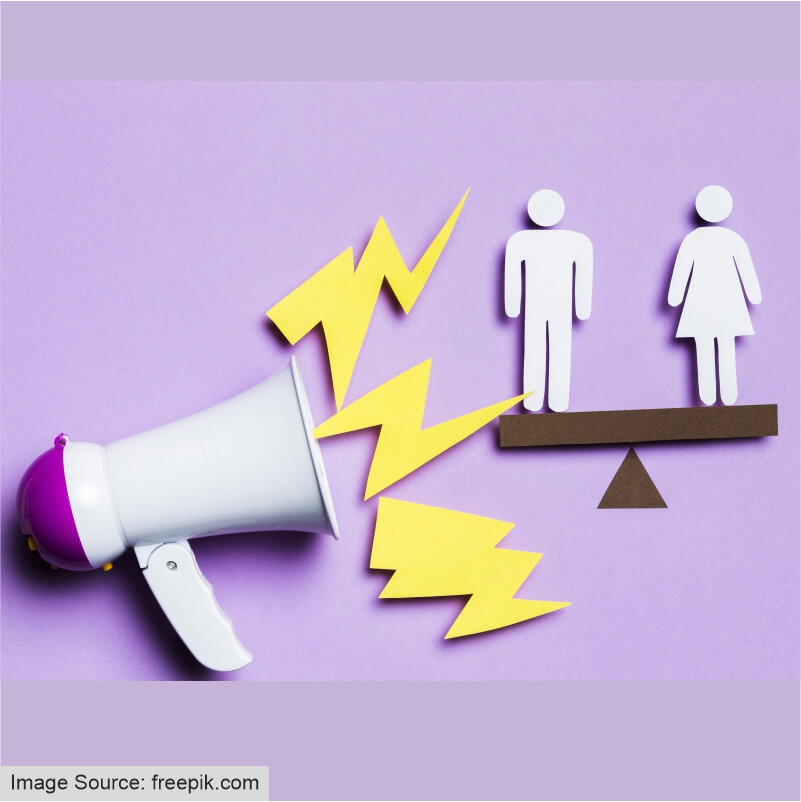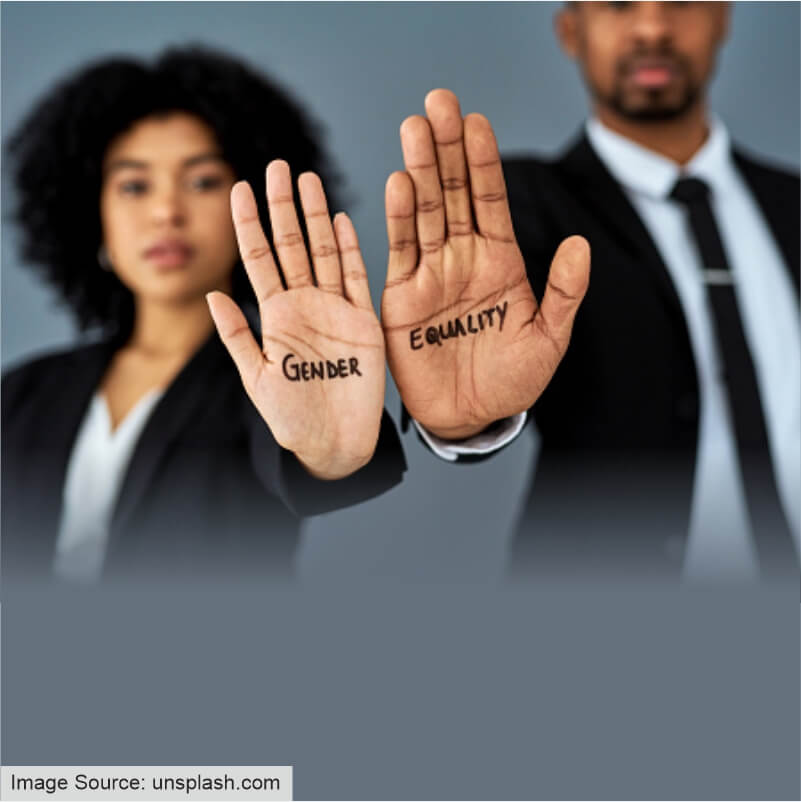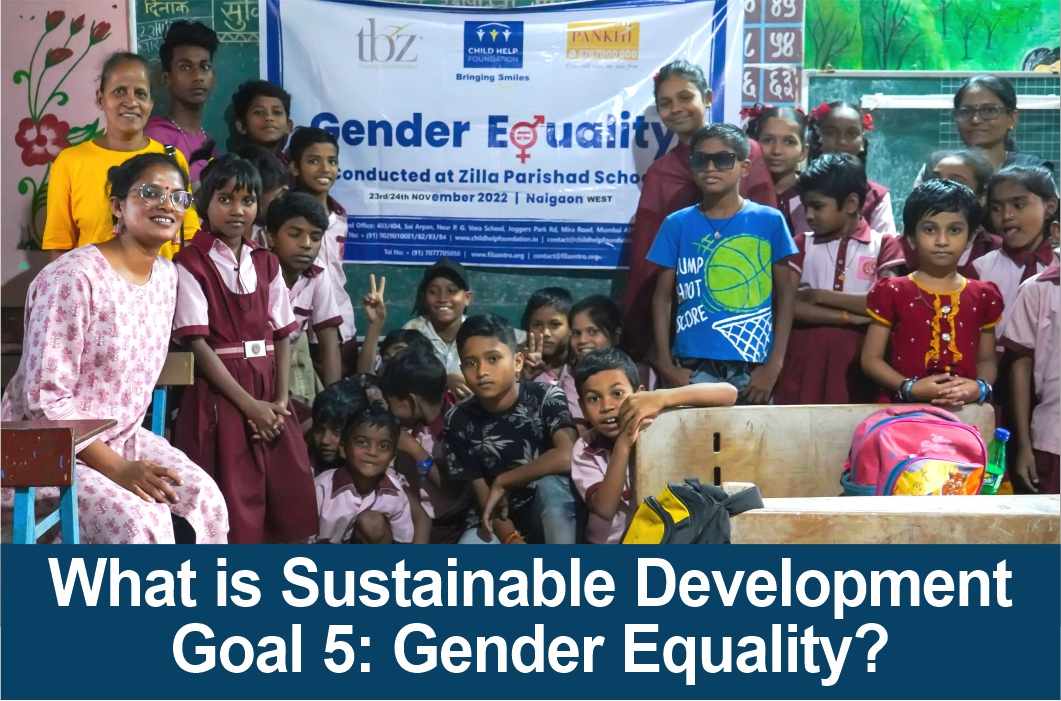The United Nations has designated "Achieve gender equality and empower all women and girls” as the Sustainable Development Goal 5 (SDG 5). It strives to end all forms of violence, discrimination against women and girls, and also to empower them in all aspects of life. It also aspires to guarantee women's full involvement in leadership roles and decision-making, respond to put an end to harmful customs like female genital mutilation, child marriages and make sure that everyone has access to reproductive health and rights.
Gender equality refers to giving everyone, regardless of gender, the same opportunity, rights, and treatments. Men and women, boys and girls, should all have equal access to resources and opportunities, including work, education, healthcare, and other services. For an equal and just society, it is important that the state of gender equality be achieved.
There are particular objectives to reach Sustainable Development Goal 5. These subjects cover a wide variety of gender-based violence experienced by women throughout the world. These objectives also help to strengthen the commitment to gender equality.

Eliminate all forms of discrimination against women and girls
The first target of the sustainable development goal is to end discrimination against women and girls in public and private places. There are many places where females still face discrimination. It takes the efforts of people, communities, and governments all around the world to eradicate discrimination against them, as it is such a complicated and complex problem. It is possible to lessen discrimination against women and girls through supporting a number of programmes and policies that advances gender equality, such as equal pay for equal labor and access to education and employment opportunities. Women's property rights, gender-based violence, and early marriage are just a few of the factors that can be used to measure discrimination against women
With this respect, Child Help Foundation organises educational sessions on Gender Equality for children in various schools. The topics covered are eliminating discrimination on the grounds of caste, income, gender, attire, height, and wealth. We also encourage discussions with children on issues like respecting each gender and societal welfare.
Eliminating violence and exploitation against females
Violence against women and girls is not just another cause of gender
inequality but also a matter of grave concern. It includes female trafficking,
sexual exploitation and other types of manipulation. It is seen in a variety
of ways, such as physical and sexual assault, financial exploitation,
psychological abuse, domestic abuse, harassment, human trafficking, and female
genital mutilation are some of the additional forms of abuse and exploitation
of women. Around 7% of women worldwide have experienced sexual abuse at the
hands of someone other than an intimate relationship. Another issue is that
many incidences of sexual abuse go unreported, which results in subpar data on
sexual violence in many nations. It is important to recognize that violence
and exploitation is not limited to any one culture, community, or country. It
is a global problem that requires a global response from people, communities,
and governments. This can include educating about the cause and consequences
of violence and exploitation, working to change attitudes and behavior that
contribute to solving this problem and to support survivors and advocate for
their rights.
Forced marriage, child marriage and female genital mutilation has a number of
notions attached to it especially among the people of remote areas. It is
carried out because of mere ignorance of real issues and lack of education in
this regard. Forced marriage is a marriage in which one or both parties do not
give their full and free consent. It can involve physical, emotional, or
financial coercion, and is often used as a means of control or to advance
political, economic, or social objectives. Forced marriage is a human rights
violation and is illegal in many countries. Female Genital Mutilation (FGM)
refers to the partial or total removal of the external female genitalia for
non-medical reasons. It is often performed on young girls and can have serious
health consequences, including pain, bleeding, infection, and even death.
According to recent data from the 31 countries where this practice is
concentrated, at least 200 million girls and women have been subjected to
female genital mutilation. To end forced marriages and female mutilation
requires a multifaceted approach that involves changing cultural and social
norms, educating communities about the harmful effects of these practices, and
supporting survivors. It also requires the support of government and
international organizations to help bring about change and provide resources
and assistance to those who need it the most. The harmful practice is becoming
less common, but progress is not fast enough to meet the global target of its
elimination by 2030.
The SDG 5 focuses on women’s roles, social protection and the promotion of
shared responsibility within the household and the family as nationally
appropriate. It targets to recognise the value of unpaid care and domestic
work at the same time. Unpaid care and domestic work includes cooking,
cleaning, fetching water, firewood or taking care of children and the elderly.
Women at least carry out two and a half times more unpaid household and care
work than men. As a result, women have less time to engage in paid labor, work
longer hours, combining paid and unpaid labor. Women's unpaid work subsidizes
the cost of care that sustains families, supports economies and often fills in
for lack of social services. Yet it is rarely recognized as “work”. It is
necessary we recognize and value unpaid care and domestic work through the
provision of public services, infrastructure, social protection policies, and
promotion of shared responsibility within the household and the family.
The SDG 5 targets to ensure that women have active participation and equal
opportunities of leadership at all levels of decision-making in political,
economic, and public life. There are several strategies that can be used such
as, increasing the representation of women in leadership prepositions through
affirmative actions policies such as quotas. Similarly, addressing barriers to
women’s participation in leadership with issues such as discrimination,
harassment and bias supportive resources. The SDG 5 also targets to promote
and encourage women in leadership development opportunities, by providing
training, mentorship and networking opportunities, to help women develop and
pursue skills and knowledge they need to succeed in leadership roles which
will benefit many countries. By doing so it will ensure that women have a
strong and individual voice in decision making processes as it involves women
in key decision making forums and their perspectives and experiences
Under Child Help Foundation’s project at Gulabigaon, Nashik, Maharashtra skill training is provided to women and sessions on women empowerment are organized to promote participation in financial activities. Establishment of a Business hub and skill development facilities is being constructed to increase the opportunities for the women and villagers.
Universal reproductive rights and health care
Women’s reproductive rights are the rights of women to make decisions about
their reproductive health and well-being, including the right to access safe
and legal abortion, contraception, safe childbirth, prenatal care and family
planning services. Another aspect is to ensure universal access to help reduce
maternal and infant mortality rate, and contribute to overall improved health
and well being for women and their families. However, many women around the
world face barriers in exercising their reproductive rights as they lack
access to affordable and high quality services, cultural and social norms that
restrict women in decision making and lack legal protection as well. It is
important for governments, civil society organizations and other stakeholders
to work together to ensure that all women have equal opportunity to exercise
their rights and health care services they need.
In lieu of achieving the universal target of women's reproductive and health care, Child Help Foundation has taken on the wide scale project of constructing Breast Feeding Centers nationwide. It is to provide private, clean and safe nursing or lactating rooms for mothers to breastfeed their infants in public places. Our BFCs are majorly operational in railway stations, temples and hospitals across Maharashtra, Kerala, Bihar and West Bengal.
Equal rights to economic resources, property, ownership and financial services
Since the dawn of time, women have typically had no access to economic rights
like land ownership and financial services since men were considered as being
superior. The Sustainable Development Goal 5 targets to undertake reforms to
give women equal rights to economic resources, access to ownership and control
over land and other forms of property, financial services, inheritance and
natural resources, in accordance with national laws.
Technology is an important tool for learning, sharing and engaging with
people. In many societies, women face barriers to accessing and controlling
economic resources, which can limit their ability to participate fully in the
economy and make decisions about their own life. By enhancing the use of
technology, in particular information and communications, to promote the
empowerment of women will help them to get equal rights to economic resources,
property, ownership, and financial services. It is seen that the use of
technology among men is higher than that of women, hence women in rural areas
tend to face inequality.

Adopt and strengthen policies and enforceable legislation for gender equality
As gender inequality is a global aspect it is necessary that the people,
government and other organizations adopt, strengthen and enforce legislation
to promote gender equality and empower women and girls at all levels by 2030.
Some specific policies and legislation that can help countries to achieve
these goals are by adopting laws and policies, social protection programmes,
healthcare facilities and access to quality education.
SDG 5 (Sustainable Development Goal 5) calls for governments, civil society organizations, and people all across the world to work together to achieve gender equality. A few steps that can be taken to advance gender equality is to establish and put into effect laws and policies that uphold the rights of women and girls and active advocacy of them. Building support for gender equality programmes can be aided by increasing understanding of the significance of gender equality and the negative effects that gender discrimination can have on the lives of women and girls. This can involve activities like media outreach, professional and policymaker training programmes, and public education campaigns. In general, there are a lot of things that can be done to advance gender equality and give women and girls all around the world more authority. To effect long-lasting change, people and organizations at all levels must be committed and make an effort.
Child Help Foundation’s efforts till date lies in undertaking Gender Equality sessions for school children to develop an unbiased foundation, looking after the needs of the underprivileged people of the LGBTQIA community, providing skill-set training for women of remote areas, the continuous efforts of normalising Breastfeeding and so on.
Check out all our running and upcoming initiatives that work to achieve Gender Equality goals.
“It is necessary for us to improve our thoughts and actions on gender equality, the world in its original nurture is equalized and so should we be.”
